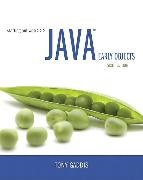Read more
List of contents
Brief Contents
- Introduction to Computers and Java
- Java Fundamentals
- A First Look at Classes and Objects
- Decision Structures
- Loops and Files
- A Second Look at Classes and Objects
- Arrays and the ArrayList Class
- Text Processing and Wrapper Classes
- Inheritance
- Exceptions and Advanced File I/O
- JavaFX: GUI Programming and Basic Controls
- JavaFX: Advanced Controls
- JavaFX: Graphics, Effects, and Media
- Recursion
- Databases
Appendix A The ASCII/Unicode Characters
Appendix B Operator Precedence and Associativity
Index
Credits
Appendixes C–M Available on the book’s online resource page Case Studies 1–4 Available on the book’s online resource page Available on the Computer Science Portal at www.pearsonhighered.com/gaddis:
- Appendix C Java Key Words
- Appendix D Installing the JDK and Using the JDK Documentation
- Appendix E Using the javadoc Utility
- Appendix F More about the Math Class
- Appendix G Packages
- Appendix H Working with Records and Random-Access Files
- Appendix I Configuring Java DB
- Appendix J The QuickSort Algorithm
- Appendix K N amed Colors
- Appendix L Answers to Checkpoints Questions
- Appendix M Answers to Odd-Numbered Review Questions
- Case Study 1 The Amortization Class
- Case Study 2 The PinTester Class
- Case Study 3 Parallel Arrays
- Case Study 4 The SerialNumber Class
About the author
Tony Gaddis is the principal author of the Starting Out With series of textbooks. Tony has nearly two decades of experience teaching computer science courses, primarily at Haywood Community College. He is a highly acclaimed instructor who was previously selected as the North Carolina Community College “Teacher of the Year” and has received the Teaching Excellence award from the National Institute for Staff and Organizational Development. The Starting Out With series includes introductory books covering C++, JavaTM, Microsoft® Visual Basic®, Microsoft® C#®, Python®, Programming Logic and Design, Alice, and App Inventor, all published by Pearson. More information about all these books can be found at www.pearsonhighered.com/gaddisbooks.
Summary
For courses in Java programming
A clear and student-friendly way to teach the fundamentals of Java
Starting Out with Java: Early Objects, 6th Edition features Tony Gaddiss accessible, step-by-step presentation which helps beginning students understand the important details necessary to become skilled programmers at an introductory level. Gaddis motivates the study of both programming skills and the Java programming language by presenting all the details needed to understand the how and the whybut never losing sight of the fact that most beginners struggle with this material. His approach is gradual and highly accessible, ensuring that students understand the logic behind developing high-quality programs.
In Starting Out with Java: Early Objects, Gaddis looks at objectsthe fundamentals of classes and methodsbefore
covering procedural programming. As with all Gaddis texts, clear and easy-to-read code listings, concise and practical real world examples, and an abundance of exercises appear in every chapter. Updates to the 6th Edition include revised, improved problems throughout and three new chapters on JavaFX.

